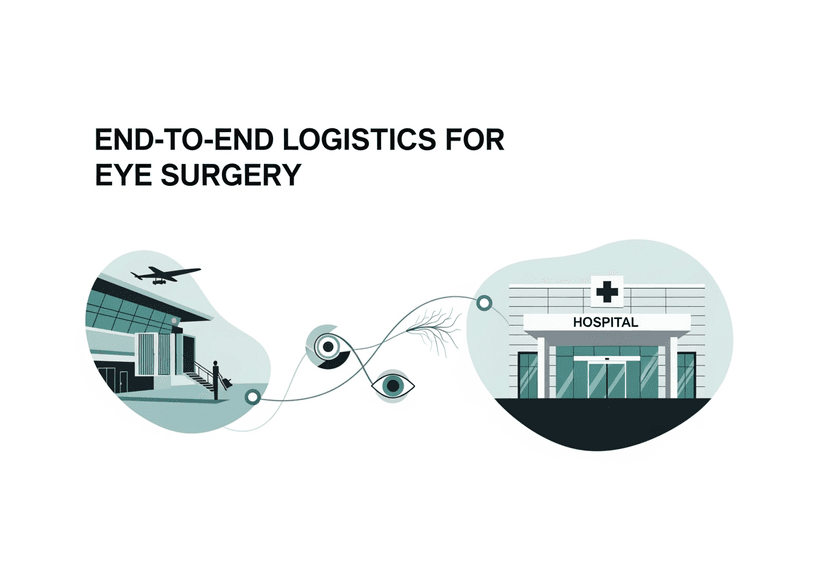
Comparing Success Rates of Liver Transplant Across Healthtrip Hospitals
15 Oct, 2025
 Healthtrip
Healthtrip- Where are Liver Transplants Offered Through Healthtrip? < li>Why Liver Transplant Success Rates Matter
- Factors Affecting Liver Transplant Success Rates
- Comparing Liver Transplant Success Rates Across Healthtrip Hospitals
- Case Studies and Examples of Successful Liver Transplants < li>Choosing the Right Hospital for Your Liver Transplant
- Conclusion
Understanding Liver Transplant Success Rates
So, what exactly do we mean by "success rate" when we talk about liver transplants? Well, it's not quite as simple as a pass-or-fail grade. Generally, it refers to the percentage of patients who are still alive and well a certain period after their transplant. Usually, this is measured at one year, five years, and sometimes even ten years post-transplant. These numbers give us an idea of how well the transplanted liver is functioning and how effectively the patient is recovering and managing their health afterward. However, it's crucial to remember that these are just averages, and individual outcomes can vary greatly! Factors like the patient’s overall health before the transplant, the cause of their liver disease, their age, and even their lifestyle after the transplant can all play a significant role. It's also worth noting that "success" isn't solely about survival; it's about the quality of life post-transplant, including the ability to return to work, enjoy hobbies, and live a fulfilling life. Therefore, when evaluating hospitals, consider not just the numbers, but also the comprehensive care and support they offer throughout the entire transplant journey.
Most popular procedures in India
Factors Influencing Transplant Outcomes
Okay, let's get into the nitty-gritty! Several things can impact how well a liver transplant goes. One of the big ones is the patient's overall health before the surgery. If someone is already dealing with other serious health issues, like heart problems or diabetes, it can make the transplant process more complicated. The cause of the liver disease also matters. For example, patients with liver damage from alcohol abuse might face different challenges than those with viral hepatitis. Then there's the age factor – generally, younger patients tend to have better outcomes than older ones, but that's not always the case. And let's not forget the surgeon's skill and the hospital's experience. Hospitals like Fortis Memorial Research Institute and the Memorial hospitals in Istanbul are known for their experienced transplant teams. Post-transplant care is also super important! Patients need ongoing monitoring, medication management (especially immunosuppressants to prevent rejection), and lifestyle adjustments to keep their new liver happy and healthy. Things like diet, exercise, and avoiding alcohol are crucial for long-term success. Ultimately, a successful transplant is a team effort between the patient, the medical team, and even their support network!
Comparing Hospital Success Rates
Alright, let's talk hospitals and numbers! While it's tricky to give exact, up-to-the-minute success rates for specific hospitals, we can definitely shed some light on what to look for and how to interpret the available data. Hospitals like Memorial Sisli Hospital and Memorial Bahçelievler Hospital in Turkey, as well as Fortis Memorial Research Institute in India, are often recognized for their specialized transplant units and experienced surgeons. These hospitals often publish their outcomes data, which can provide valuable insights. Keep in mind that success rates can vary based on the complexity of the cases they handle. A hospital that takes on more high-risk patients might have a slightly lower overall success rate, but that doesn't necessarily mean they're a "worse" hospital. It simply reflects the challenges they face. When you're researching hospitals, don't just focus on the headline numbers. Dig deeper! Ask about their experience with different types of liver disease, their approach to managing complications, and the support services they offer to patients and their families. Remember, you're not just choosing a hospital; you're choosing a team of people who will be with you every step of the way. Also, consider NMC Specialty Hospital in Abu Dhabi as a potential option, researching their specific liver transplant program details and reported outcomes.
Wellness Treatments
Give yourself the time to relax
Lowest Prices Guaranteed!

Lowest Prices Guaranteed!
Questions to Ask When Choosing a Hospital
Choosing a hospital for a liver transplant isn't like picking a restaurant; it's a deeply personal and critical decision! So, arm yourself with questions! First, ask about their experience. How many liver transplants do they perform each year? What's their success rate for patients with your specific type of liver disease? What are the common complications they encounter, and how do they manage them? Then, delve into the expertise of the transplant team. Are the surgeons board-certified and experienced in liver transplantation? What about the nurses, hepatologists, and other specialists? What kind of pre- and post-transplant support do they offer? Do they have dedicated social workers, nutritionists, and counselors to help you navigate the physical and emotional challenges of the transplant process? Also, don’t be shy about asking about the hospital's technology and facilities. Do they have state-of-the-art imaging equipment and operating rooms? What's their infection control protocol? And finally, talk to other patients who have undergone liver transplants at the hospital. Their experiences can provide invaluable insights into the quality of care and the overall patient experience. Remember, finding the right hospital is about finding a place where you feel confident, comfortable, and supported!
Healthtrip's Role in Your Transplant Journey
Okay, so you're armed with information about liver transplants and how to assess hospitals. Now, how does Healthtrip fit into all this? We're here to be your trusted guide and advocate throughout your entire medical journey. We understand that navigating the complex world of healthcare can be overwhelming, especially when you're dealing with a serious condition like end-stage liver disease. That's why we offer a range of services to simplify the process and empower you to make informed decisions. We can help you research and compare different hospitals, like Memorial Sisli Hospital, Memorial Bahçelievler Hospital, Fortis Memorial Research Institute, and NMC Specialty Hospital, providing you with detailed information about their transplant programs, success rates, and patient testimonials. We can connect you with experienced transplant surgeons and specialists, facilitating consultations and helping you get second opinions. We can also assist with travel arrangements, visa applications, and accommodation, making your medical trip as smooth and stress-free as possible. But most importantly, we're here to provide you with personalized support and guidance every step of the way. We'll answer your questions, address your concerns, and ensure that you have the resources and information you need to make the best decisions for your health and well-being. With Healthtrip, you're not alone on this journey!
Where are Liver Transplants Offered Through Healthtrip?
When facing the daunting prospect of a liver transplant, finding the right medical facility becomes paramount. Healthtrip understands the weight of this decision and strives to connect patients with world-class hospitals renowned for their expertise in liver transplantation. Our network spans across continents, offering a diverse range of options to suit individual needs and preferences. From the bustling metropolis of Bangkok, Thailand, where institutions like Bangkok Hospital and Vejthani Hospital boast cutting-edge technology and highly skilled transplant teams, to the technologically advanced medical centers in Germany such as Helios Klinikum Erfurt and Helios Emil von Behring, Healthtrip provides access to a global pool of medical excellence. We also feature hospitals in vibrant cities like Istanbul, Turkey, where LIV Hospital stands out for its comprehensive transplant program. For those seeking options closer to home, we collaborate with leading hospitals in the United Arab Emirates, including NMC Specialty Hospital, Al Nahda, Dubai, and in India at Fortis Memorial Research Institute, Gurgaon, and Max Healthcare Saket. Each of these hospitals has undergone thorough vetting by Healthtrip to ensure they meet our stringent standards for quality of care, patient safety, and transplant success rates. We believe in empowering patients with choices, allowing them to select the hospital that best aligns with their medical requirements, financial considerations, and personal preferences, ultimately increasing their chances of a positive outcome.
Our commitment goes beyond simply listing hospitals; we provide detailed profiles that include information on the transplant team's experience, the types of liver diseases they treat, the transplant techniques they employ, and the support services they offer. This comprehensive approach allows patients to make informed decisions and feel confident in their choice of medical facility. Because let's face it, choosing a hospital for a liver transplant is a big deal. It's not like picking out a new restaurant; it's a life-altering decision, and we want to make sure you have all the information you need to make the right one. Healthtrip acts as your trusted partner throughout this journey, offering personalized assistance to navigate the complexities of international healthcare, including visa assistance, travel arrangements, and post-operative care coordination. We understand that undergoing a liver transplant is a physically and emotionally demanding experience, and we are dedicated to providing unwavering support every step of the way. With Healthtrip, you gain access to a world of possibilities, connecting you with the best liver transplant centers across the globe, ensuring you receive the highest quality care and have the best chance at a healthy future.
Why Liver Transplant Success Rates Matter
Liver transplant success rates are more than just numbers; they represent hope, extended life, and improved quality of life for individuals facing end-stage liver disease. Understanding these rates is crucial for patients and their families as they navigate the complex landscape of liver transplantation and make informed decisions about their treatment options. A higher success rate indicates a hospital's proficiency in performing liver transplants, managing post-operative complications, and providing comprehensive care to transplant recipients. Think of it like this: if you were hiring a pilot, wouldn't you want one with a stellar safety record? Similarly, when it comes to something as serious as a liver transplant, the success rate is a key indicator of the hospital's expertise and the likelihood of a positive outcome. Healthtrip recognizes the significance of success rates and provides transparent information on the performance of hospitals within our network.
While success rates should not be the sole determinant in choosing a transplant center, they offer valuable insights into the overall quality of care and the experience of the transplant team. A hospital with consistently high success rates likely possesses advanced surgical techniques, a well-coordinated multidisciplinary team, and robust protocols for patient selection and post-transplant management. These factors contribute to minimizing risks and maximizing the chances of graft survival and long-term health. Let’s be real, nobody wants to be a statistic, and knowing that a hospital has a strong track record can provide a sense of reassurance during a stressful and uncertain time. Healthtrip empowers patients to compare success rates across different hospitals, taking into account factors such as the complexity of cases treated, the types of transplant procedures performed (living donor vs. deceased donor), and the patient demographics. By providing this comprehensive data, we aim to help patients make informed decisions that align with their individual needs and circumstances. Keep in mind that success rates are constantly evolving as medical advancements continue to improve transplant outcomes. Healthtrip remains committed to staying up-to-date on the latest data and providing accurate and reliable information to our patients.
Furthermore, it's essential to consider the specific metrics used to calculate success rates, such as one-year survival, five-year survival, and graft survival. Each of these metrics provides a different perspective on the long-term outcomes of liver transplantation. For example, one-year survival rates reflect the immediate post-transplant period, while five-year survival rates offer insights into the durability of the transplant over a longer timeframe. Graft survival, on the other hand, measures the percentage of transplanted livers that are still functioning at a specific point in time. Healthtrip provides clear definitions of these metrics to ensure patients understand the nuances of liver transplant success rates. Choosing a hospital with a proven track record of success can significantly improve your chances of a positive outcome and a return to a healthy, fulfilling life. And that, at the end of the day, is what truly matters.
Factors Affecting Liver Transplant Success Rates
Liver transplant success rates aren't etched in stone; they're influenced by a complex interplay of factors, both patient-related and hospital-related. Understanding these factors is crucial for patients to have realistic expectations and to actively participate in optimizing their outcomes. Patient-related factors include the underlying cause of liver disease, the patient's overall health condition, age, and adherence to post-transplant medications and lifestyle recommendations. For instance, patients with severe co-morbidities, such as advanced heart disease or uncontrolled diabetes, may face a higher risk of complications and a lower likelihood of long-term success. Similarly, older patients may experience a slower recovery and be more susceptible to infections. However, these are just general trends, and each patient's situation is unique. The good news is that many of these factors can be managed and mitigated through careful pre-transplant evaluation and preparation, as well as diligent post-transplant care.
Hospital-related factors include the experience and expertise of the transplant team, the availability of advanced technology and resources, and the hospital's protocols for patient selection and post-transplant management. A highly skilled and experienced transplant team is better equipped to handle complex surgical procedures, manage post-operative complications, and provide personalized care tailored to each patient's needs. Access to advanced technology, such as minimally invasive surgical techniques and sophisticated imaging modalities, can also contribute to improved outcomes. Furthermore, hospitals with robust protocols for patient selection are better able to identify suitable candidates for transplantation and minimize the risk of complications. Healthtrip carefully assesses these hospital-related factors when selecting hospitals for our network, ensuring that patients have access to facilities with the highest standards of care. Think of it as a recipe for success – the right ingredients (patient factors) combined with the right cooking techniques (hospital factors) can lead to a delicious (successful) outcome.
Beyond these primary factors, several other elements can influence liver transplant success rates, including the type of liver transplant performed (living donor vs. deceased donor), the quality of the donor liver, and the presence of any pre-existing infections. Living donor transplants often offer shorter waiting times and better graft quality, potentially leading to improved outcomes. However, they also involve a surgical procedure for the donor, which carries its own risks. The quality of the donor liver is also a critical factor, as livers with significant damage or disease may be less likely to function properly after transplantation. Finally, pre-existing infections can increase the risk of post-transplant complications and impact long-term survival. Healthtrip provides patients with detailed information on all of these factors, empowering them to make informed decisions in consultation with their transplant team. Remember, knowledge is power, and understanding the factors that can affect liver transplant success rates can help you take control of your health and optimize your chances of a positive outcome. With Healthtrip, you're not alone on this journey; we're here to provide the information and support you need to make the best possible choices for your health and well-being.
Also Read:
Comparing Liver Transplant Success Rates Across Healthtrip Hospitals
When you're facing a liver transplant, understanding the success rates of different hospitals is absolutely crucial. It's not just about the numbers, but what those numbers represent: the experience, expertise, and commitment of the medical team. Healthtrip partners with a network of leading hospitals around the world, each with its own unique strengths and specializations. Let’s dive into how we can help you compare these success rates and what to look for beyond the statistics. For instance, Fortis Memorial Research Institute, Gurgaon, boasts a strong track record in complex liver transplants, often handling cases that other centers might deem too challenging. Their success stems from a multidisciplinary approach, involving not just surgeons but also hepatologists, radiologists, and dedicated nursing staff. Similarly, Max Healthcare Saket in New Delhi is renowned for its advanced transplant technology and meticulous post-operative care, which significantly contributes to positive outcomes. In Thailand, Vejthani Hospital and Yanhee International Hospital are popular choices, known for their comprehensive pre- and post-transplant support and relatively lower costs. Meanwhile, in Turkey, both Memorial Bahçelievler Hospital and LIV Hospital, Istanbul, have established themselves as centers of excellence with impressive success rates. It's also worth considering hospitals like Mount Elizabeth Hospital in Singapore, known for their state-of-the-art facilities and stringent protocols. Healthtrip provides you with detailed profiles of each hospital, including their success rates, patient testimonials, and information on the transplant team. We also help you understand the nuances of these statistics so you can make an informed decision. Remember, finding the right hospital is about finding the best fit for your individual needs and circumstances.
Understanding the Data
Comparing success rates isn't as simple as looking at a single number. Different hospitals may use different methodologies for calculating their success rates. Some may include all patients, while others might exclude those with particularly complex conditions. Healthtrip provides you with standardized data and clear explanations so you can make apples-to-apples comparisons. For example, we look at one-year and five-year survival rates, as well as graft survival rates, which indicate how well the transplanted liver is functioning. We also consider the types of patients each hospital typically treats. Some hospitals specialize in pediatric liver transplants, while others focus on adults with specific liver diseases. Understanding these differences is essential for making the right choice. Furthermore, Healthtrip takes into account the hospital's accreditation and certifications, which are indicators of quality and safety. We also consider patient satisfaction scores and feedback, providing you with a holistic view of each hospital's performance. Our goal is to empower you with the information you need to confidently choose the hospital that will give you the best chance of a successful transplant.
Case Studies and Examples of Successful Liver Transplants
Hearing stories about real-life liver transplant successes can be incredibly inspiring and reassuring. At Healthtrip, we believe in sharing these stories to offer hope and demonstrate the potential for a renewed lease on life. Let's consider a few examples that highlight the diverse range of successful transplant journeys facilitated through our network. Take the case of Sarah, a young mother from the UK who was diagnosed with primary biliary cholangitis. After extensive research and consultation with Healthtrip's medical advisors, she chose to undergo a liver transplant at Fortis Memorial Research Institute, Gurgaon. The surgery was a success, and Sarah is now back home, enjoying life with her family. Her story exemplifies the importance of early diagnosis and proactive treatment. Then there's David, a retired teacher from the US, who suffered from cirrhosis due to hepatitis C. He was initially hesitant to travel abroad for treatment but was convinced by Healthtrip's comprehensive support system and the expertise of the transplant team at Memorial Sisli Hospital in Istanbul. David's transplant was also successful, and he's now pursuing his passion for painting. These are just a few examples of the many successful liver transplants facilitated through Healthtrip. Each case underscores the importance of choosing the right hospital, having a strong support system, and maintaining a positive attitude. Healthtrip is committed to providing you with the resources and guidance you need to embark on your own successful transplant journey.
Learning from Specific Cases
These case studies aren't just feel-good stories; they offer valuable insights into the transplant process. By examining the specific circumstances of each patient, we can learn about the challenges they faced, the decisions they made, and the factors that contributed to their positive outcomes. For instance, in Sarah's case, her quick decision to undergo a transplant after diagnosis played a crucial role in her success. Her willingness to explore options abroad and trust the expertise of the medical team at Fortis Memorial Research Institute, Gurgaon, was also key. In David's case, his thorough research and the comprehensive support he received from Healthtrip, including pre- and post-operative care coordination, made a significant difference. We also analyze cases where patients faced complications or unexpected challenges. By understanding these challenges, we can develop strategies to mitigate risks and improve patient outcomes. Healthtrip's multidisciplinary team of medical advisors, case managers, and patient coordinators is dedicated to providing you with personalized support and guidance throughout the transplant process. We work closely with you to understand your unique needs and circumstances, ensuring that you receive the best possible care.
Also Read:
Choosing the Right Hospital for Your Liver Transplant
Selecting the right hospital for your liver transplant is perhaps the most critical decision you'll make. It's a decision that should be based on a careful evaluation of various factors, including the hospital's expertise, success rates, technology, and support services. Healthtrip is here to guide you through this process, providing you with the information and resources you need to make an informed decision. First and foremost, consider the hospital's experience in performing liver transplants. How many transplants do they perform each year? What is their success rate compared to the national average? Do they specialize in certain types of transplants, such as living-donor transplants or pediatric transplants? Hospitals like Fortis Memorial Research Institute, Gurgaon, Max Healthcare Saket, and Memorial Sisli Hospital are known for their high volumes and excellent outcomes. Next, evaluate the hospital's technology and facilities. Do they have state-of-the-art surgical equipment, advanced imaging capabilities, and a dedicated transplant unit? Do they offer minimally invasive surgical techniques, which can lead to faster recovery times? Vejthani Hospital and Yanhee International Hospital in Thailand are known for their modern facilities and patient-centered care. Don't forget to consider the hospital's support services. Do they have a dedicated team of transplant coordinators, social workers, and nutritionists? Do they offer pre- and post-transplant education and support groups? Healthtrip's patient coordinators can help you navigate these considerations and connect you with the resources you need. Ultimately, choosing the right hospital is a personal decision. It's about finding a place where you feel comfortable, confident, and cared for.
Factors Beyond Statistics
While success rates are important, they don't tell the whole story. Consider the hospital's approach to patient care. Do they prioritize communication and shared decision-making? Do they involve patients and their families in the treatment planning process? Do they offer personalized care plans tailored to individual needs? Healthtrip emphasizes the importance of patient-centered care. We believe that patients should be actively involved in their treatment decisions and that their preferences and values should be respected. That’s why we provide you with information on the hospital's patient satisfaction scores and feedback from other patients. We also encourage you to visit the hospital, meet the transplant team, and ask questions. This will give you a better sense of the hospital's culture and whether it's the right fit for you. Furthermore, consider the hospital's location and accessibility. Is it easy to travel to? Does it have accommodations for patients and their families? Healthtrip can help you with travel arrangements and accommodation booking, ensuring that your journey is as smooth as possible. Remember, choosing the right hospital is about finding a place where you feel safe, supported, and empowered to take control of your health.
Also Read:
Conclusion
Embarking on a liver transplant journey is undoubtedly a significant and often overwhelming experience. But with the right information, support, and guidance, it's a journey that can lead to a healthier, happier life. Healthtrip is committed to being your trusted partner every step of the way, from providing you with detailed information on hospitals and success rates to coordinating your travel arrangements and offering ongoing support. We understand that choosing the right hospital is a crucial decision, and we're here to help you navigate the complexities of the healthcare landscape. Our team of medical advisors, case managers, and patient coordinators is dedicated to providing you with personalized care and ensuring that you receive the best possible treatment. Whether you're considering a transplant at Fortis Memorial Research Institute, Gurgaon, Max Healthcare Saket, Memorial Sisli Hospital, Vejthani Hospital, Yanhee International Hospital, or any other hospital in our network, we're here to support you. Remember, you're not alone. Healthtrip is here to empower you with the knowledge and resources you need to make informed decisions and take control of your health. Together, we can make your liver transplant journey a success.
Related Blogs

How Healthtrip Ensures Quality & Safety in Eye Surgery Procedures
Detailed guide on eye surgery, featuring doctors, hospitals, risks, recovery,

End-to-End Logistics for Eye Surgery with Healthtrip's Support
Detailed guide on eye surgery, featuring doctors, hospitals, risks, recovery,

Healthtrip's Care Coordinators: Your Support During Eye Surgery
Detailed guide on eye surgery, featuring doctors, hospitals, risks, recovery,

Top 5 Indian Hospitals for Eye Surgery
Detailed guide on eye surgery, featuring doctors, hospitals, risks, recovery,

Post-Eye Surgery Diet and Lifestyle Tips
Detailed guide on eye surgery, featuring doctors, hospitals, risks, recovery,

Common Risks in Eye Surgery and How Healthtrip Manages Them
Detailed guide on eye surgery, featuring doctors, hospitals, risks, recovery,










